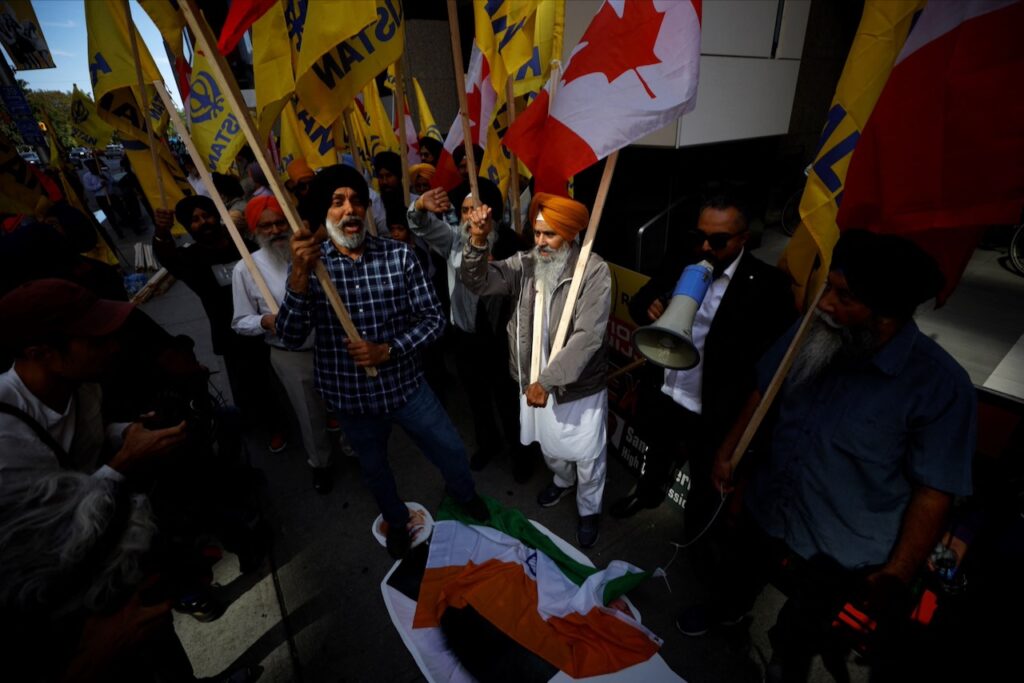
Source: IFEX /Getty Images
Bilal Ghazanfar
Due to its rising economic and military strength, India is beginning to exert its influence beyond South Asia. However, its security anxieties are also having destabilizing impacts on regional and global peace. The rising tension between India and Canada, after the killing of Khalistan separatist leader Hardeep Singh Najar in Canada, reports from the United States’ Justice Department regarding India’s involvement in transnational repression, and India’s Defence Minister Rajnath Singh’s claim of killing 20 people in Pakistan highlight that country’s blatant violation of international law and values that are centered on respecting territorial integrity and sovereignty. This transnational repression perpetrated by India, much like state-sponsored terrorism, is disruptive for global peace.
These developments, therefore, warrant a question: Will Indian nationalism, imbued with radical, Hindutva-driven policies under the Bharatiya Janata Party (BJP) government, play a similarly disruptive role as Serbian nationalism did in Europe? While the comparison might not be accurate at this stage, there is no denying that recent developments have raised concerns among U.S. policymakers who view India as a strategic partner in the Indo-Pacific region to contain China.
Global politics often induces problematic trade-offs for states when they have to demonstrate their commitment either to values-based or interests-based foreign policies. While generally, states prefer to minimize transactional costs, sometimes they exceed the benefits. U.S. geostrategic interests are currently aligned with those of India, but this partnership requires a delicate balance to counter Hindutva nationalists who use narratives to produce incongruent expectations like “either you are with us or against us”, for India’s partners. Moreover, the U.S., as a global leader, must steer this partnership carefully, ensuring that it does not contribute to regional and global instability. Ensuring this is especially important at a time when Washington’s global leadership is under scrutiny because of its policies towards the Hamas- Israel conflict and the Russia-Ukraine war.
This situation offers two options to U.S. policymakers: either to stand with U.S. values or to go with its parochial interests. Over the past two decades, U.S. foreign policy has come under intense criticisms because of its double standards, which were mostly towards rivals or dispensable states. In its role as a global hegemon, the U.S. ignored the extrajudicial killings, democratic backslidings , and human rights violations by their allies while implicating others. However, this old formula is no longer workable because of changing geopolitical realities marked by China offering an alternative socioeconomic model. Moreover, the dissident opinion among the U.S. public, owing to social media, is another stumbling block, as evidenced by the recent protests against Israel’s oppression in Gaza.
Qian Feng, Director, Research Department, National Strategy Institute of Tsinghua University, states that the U.S., in recent years, has been waving the banner of common values of democracy and freedom, attempting to build comprehensive cooperation with India to contain China. However, it is willing to turn a blind eye towards what it thinks are India’s human rights abuses and infringement of domestic minorities. This badly exposes U.S. hypocrisy when it comes to dealing with India.
All this presents a complex challenge for U.S. policymakers, requiring careful consideration of various factors, including potential reputational and strategic implications. Washington’s democratic credentials will further erode if it makes values trade-off for interests. President Trump’s era is a cautionary tale for U.S. policymakers. During his tenure, the U.S. suffered greatly when his whims were at work. It left many platforms like the Trans-Pacific Partnership (TPP) and the Paris Climate Agreement 2015, which lately proved counterproductive. Turning a blind eye towards India’s transnational repression would be seen as a strategically myopic policy. It is a tightrope walk for the U.S., and to find the right balance, it needs to navigate these strategic complexities. Therefore, by prioritizing adherence to the core values of its foreign policy, the U.S. can reinforce its global leadership role to foster benefits beyond short-term gains.
Given the complexities of the present environment, a nuanced reevaluation of its partnership with India is imperative for the U.S. For starters, the U.S. must hold India accountable for its actions that appear to undermine the principles of sovereignty, democracy, freedom of speech, and the human and civil rights of ethnic and religious minorities. Any compromise on these professed values that guide U.S. foreign policy will be a Faustian bargain. Second, to avoid a strategic myopia, U.S. policymakers must learn a lesson from history that the policy of appeasement with fascist regimes will backfire in the long run. Third, a cost-benefit analysis of the U.S.-India partnership is needed so as to make it more values-driven.
Dr. Bilal Ghazanfar is Associate Senior Researcher, Centre for Aerospace and Security Studies (CASS), Lahore, Pakistan.
The views expressed in the article are the author’s own and do not necessarily reflect those of Pakistan Politico.




